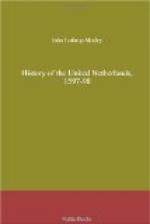But no attack was made, and the little army of Maurice was allowed to sleep off its fatigue. With the dawn of the 24th January, a reconnoitring party, sent out from the republican camp, discovered that Varax, having no stomach for an encounter, had given his enemies the slip. Long before daylight his baggage and ammunition trains had been sent off in a southerly direction, and his whole force had already left the village of Turnhout. It was the intention of the commander to take refuge in the fortified city of Herenthals, and there await the attack of Maurice. Accordingly, when the stadholder arrived on the fields beyond the immediate precincts of the village, he saw the last of the enemy’s rearguard just disappearing from view. The situation was a very peculiar one.
The rain and thaw, following upon frosty weather, had converted the fenny country in many directions into a shallow lake. The little river which flowed by the village had risen above its almost level banks, and could with difficulty be traversed at any point, while there was no permanent bridge, such as there was at Ravels. The retreating Spaniards had made their way through a narrow passage, where a roughly-constructed causeway of planks had enabled the infantry to cross the waters almost in single file, while the cavalry had floundered through as best they might. Those who were acquainted with the country reported that beyond this defile there was an upland heath, a league in extent, full of furze and thickets, where it would be easy enough for Varax to draw up his army in battle array, and conceal it from view. Maurice’s scouts, too, brought information that the Spanish commander had left a force of musketeers to guard the passage at the farther end.
This looked very like an ambush. In the opinion of Hohenlo, of Solms, and of Sidney, an advance was not to be thought of; and if the adventure seemed perilous to such hardy and experienced campaigners as these three, the stadholder might well hesitate. Nevertheless, Maurice had made up his mind. Sir Francis Vere and Marcellus Bax confirmed him in his determination, and spoke fiercely of the disgrace which would come upon the arms of the republic if now, after having made a day’s march to meet the enemy, they should turn their backs upon him just as he was doing his best to escape.
On leave obtained from the prince, these two champions, the Englishman and the Hollander, spurred their horses through the narrow pass, with the waters up to the saddle-bow, at the head of a mere handful of troopers, not more than a dozen men in all. Two hundred musketeers followed, picking their way across the planks. As they emerged into the open country beyond, the Spanish soldiers guarding the passage fled without firing a shot. Such was already the discouraging effect produced upon veterans by the unexpected order given that morning to retreat. Vere and Bax sent word for all the cavalry to advance at once, and meantime hovered about the rearguard of the retreating enemy, ready to charge upon him so soon as they should be strong enough.




